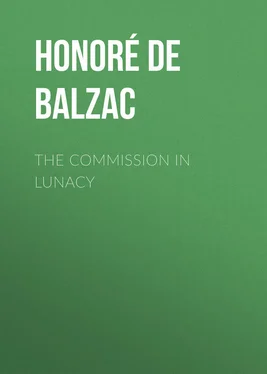Honoré Balzac - The Commission in Lunacy
Здесь есть возможность читать онлайн «Honoré Balzac - The Commission in Lunacy» — ознакомительный отрывок электронной книги совершенно бесплатно, а после прочтения отрывка купить полную версию. В некоторых случаях можно слушать аудио, скачать через торрент в формате fb2 и присутствует краткое содержание. Жанр: literature_19, foreign_antique, foreign_prose, на английском языке. Описание произведения, (предисловие) а так же отзывы посетителей доступны на портале библиотеки ЛибКат.
- Название:The Commission in Lunacy
- Автор:
- Жанр:
- Год:неизвестен
- ISBN:нет данных
- Рейтинг книги:3 / 5. Голосов: 1
-
Избранное:Добавить в избранное
- Отзывы:
-
Ваша оценка:
- 60
- 1
- 2
- 3
- 4
- 5
The Commission in Lunacy: краткое содержание, описание и аннотация
Предлагаем к чтению аннотацию, описание, краткое содержание или предисловие (зависит от того, что написал сам автор книги «The Commission in Lunacy»). Если вы не нашли необходимую информацию о книге — напишите в комментариях, мы постараемся отыскать её.
The Commission in Lunacy — читать онлайн ознакомительный отрывок
Ниже представлен текст книги, разбитый по страницам. Система сохранения места последней прочитанной страницы, позволяет с удобством читать онлайн бесплатно книгу «The Commission in Lunacy», без необходимости каждый раз заново искать на чём Вы остановились. Поставьте закладку, и сможете в любой момент перейти на страницу, на которой закончили чтение.
Интервал:
Закладка:
Honoré de Balzac
The Commission in Lunacy
Dedicated to Monsieur le Contre-Amiral Bazoche, Governor of the Isle of Bourbon, by the grateful writer.
DE BALZAC.
THE COMMISSION IN LUNACY
In 1828, at about one o’clock one morning, two persons came out of a large house in the Rue du Faubourg Saint-Honore, near the Elysee-Bourbon. One was the famous doctor, Horace Bianchon; the other was one of the most elegant men in Paris, the Baron de Rastignac; they were friends of long standing. Each had sent away his carriage, and no cab was to be seen in the street; but the night was fine, and the pavement dry.
“We will walk as far as the boulevard,” said Eugene de Rastignac to Bianchon. “You can get a hackney cab at the club; there is always one to be found there till daybreak. Come with me as far as my house.”
“With pleasure.”
“Well, and what have you to say about it?”
“About that woman?” said the doctor coldly.
“There I recognize my Bianchon!” exclaimed Rastignac.
“Why, how?”
“Well, my dear fellow, you speak of the Marquise d’Espard as if she were a case for your hospital.”
“Do you want to know what I think, Eugene? If you throw over Madame de Nucingen for this Marquise, you will swap a one-eyed horse for a blind one.”
“Madame de Nucingen is six-and-thirty, Bianchon.”
“And this woman is three-and-thirty,” said the doctor quickly.
“Her worst enemies only say six-and-twenty.”
“My dear boy, when you really want to know a woman’s age, look at her temples and the tip of her nose. Whatever women may achieve with their cosmetics, they can do nothing against those incorruptible witnesses to their experiences. There each year of life has left its stigmata. When a woman’s temples are flaccid, seamed, withered in a particular way; when at the tip of her nose you see those minute specks, which look like the imperceptible black smuts which are shed in London by the chimneys in which coal is burnt… Your servant, sir! That woman is more than thirty. She may be handsome, witty, loving – whatever you please, but she is past thirty, she is arriving at maturity. I do not blame men who attach themselves to that kind of woman; only, a man of your superior distinction must not mistake a winter pippin for a little summer apple, smiling on the bough, and waiting for you to crunch it. Love never goes to study the registers of birth and marriage; no one loves a woman because she is handsome or ugly, stupid or clever; we love because we love.”
“Well, for my part, I love for quite other reasons. She is Marquise d’Espard; she was a Blamont-Chauvry; she is the fashion; she has soul; her foot is as pretty as the Duchesse de Berri’s; she has perhaps a hundred thousand francs a year – some day, perhaps, I may marry her! In short, she will put me into a position which will enable me to pay my debts.”
“I thought you were rich,” interrupted Bianchon.
“Bah! I have twenty thousand francs a year – just enough to keep up my stables. I was thoroughly done, my dear fellow, in that Nucingen business; I will tell you about that. – I have got my sisters married; that is the clearest profit I can show since we last met; and I would rather have them provided for than have five hundred thousand francs a year. No, what would you have me do? I am ambitious. To what can Madame de Nucingen lead? A year more and I shall be shelved, stuck in a pigeon-hole like a married man. I have all the discomforts of marriage and of single life, without the advantages of either; a false position to which every man must come who remains tied too long to the same apron-string.”
“So you think you will come upon a treasure here?” said Bianchon. “Your Marquise, my dear fellow, does not hit my fancy at all.”
“Your liberal opinions blur your eyesight. If Madame d’Espard were a Madame Rabourdin…”
“Listen to me. Noble or simple, she would still have no soul; she would still be a perfect type of selfishness. Take my word for it, medical men are accustomed to judge of people and things; the sharpest of us read the soul while we study the body. In spite of that pretty boudoir where we have spent this evening, in spite of the magnificence of the house, it is quite possible that Madame la Marquise is in debt.”
“What makes you think so?”
“I do not assert it; I am supposing. She talked of her soul as Louis XVIII. used to talk of his heart. I tell you this: That fragile, fair woman, with her chestnut hair, who pities herself that she may be pitied, enjoys an iron constitution, an appetite like a wolf’s, and the strength and cowardice of a tiger. Gauze, and silk, and muslin were never more cleverly twisted round a lie! Ecco.”
“Bianchon, you frighten me! You have learned a good many things, then, since we lived in the Maison Vauquer?”
“Yes, since then, my boy, I have seen puppets, both dolls and manikins. I know something of the ways of the fine ladies whose bodies we attend to, saving that which is dearest to them, their child – if they love it – or their pretty faces, which they always worship. A man spends his nights by their pillow, wearing himself to death to spare them the slightest loss of beauty in any part; he succeeds, he keeps their secret like the dead; they send to ask for his bill, and think it horribly exorbitant. Who saved them? Nature. Far from recommending him, they speak ill of him, fearing lest he should become the physician of their best friends.
“My dear fellow, those women of whom you say, ‘They are angels!’ I – I – have seen stripped of the little grimaces under which they hide their soul, as well as of the frippery under which they disguise their defects – without manners and without stays; they are not beautiful.
“We saw a great deal of mud, a great deal of dirt, under the waters of the world when we were aground for a time on the shoals of the Maison Vauquer. – What we saw there was nothing. Since I have gone into high society, I have seen monsters dressed in satin, Michonneaus in white gloves, Poirets bedizened with orders, fine gentlemen doing more usurious business than old Gobseck! To the shame of mankind, when I have wanted to shake hands with Virtue, I have found her shivering in a loft, persecuted by calumny, half-starving on a income or a salary of fifteen hundred francs a year, and regarded as crazy, or eccentric, or imbecile.
“In short, my dear boy, the Marquise is a woman of fashion, and I have a particular horror of that kind of woman. Do you want to know why? A woman who has a lofty soul, fine taste, gentle wit, a generously warm heart, and who lives a simple life, has not a chance of being the fashion. Ergo: A woman of fashion and a man in power are analogous; but there is this difference: the qualities by which a man raises himself above others ennoble him and are a glory to him; whereas the qualities by which a woman gains power for a day are hideous vices; she belies her nature to hide her character, and to live the militant life of the world she must have iron strength under a frail appearance.
“I, as a physician, know that a sound stomach excludes a good heart. Your woman of fashion feels nothing; her rage for pleasure has its source in a longing to heat up her cold nature, a craving for excitement and enjoyment, like an old man who stands night after night by the footlights at the opera. As she has more brain than heart, she sacrifices genuine passion and true friends to her triumph, as a general sends his most devoted subalterns to the front in order to win a battle. The woman of fashion ceases to be a woman; she is neither mother, nor wife, nor lover. She is, medically speaking, sex in the brain. And your Marquise, too, has all the characteristics of her monstrosity, the beak of a bird of prey, the clear, cold eye, the gentle voice – she is as polished as the steel of a machine, she touches everything except the heart.”
Читать дальшеИнтервал:
Закладка:
Похожие книги на «The Commission in Lunacy»
Представляем Вашему вниманию похожие книги на «The Commission in Lunacy» списком для выбора. Мы отобрали схожую по названию и смыслу литературу в надежде предоставить читателям больше вариантов отыскать новые, интересные, ещё непрочитанные произведения.
Обсуждение, отзывы о книге «The Commission in Lunacy» и просто собственные мнения читателей. Оставьте ваши комментарии, напишите, что Вы думаете о произведении, его смысле или главных героях. Укажите что конкретно понравилось, а что нет, и почему Вы так считаете.












